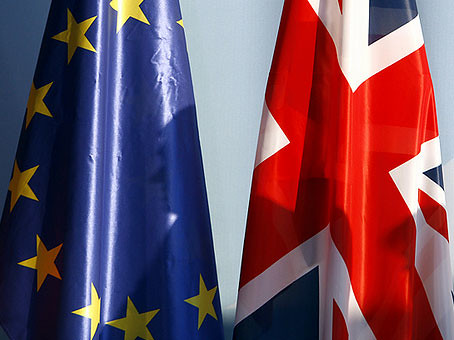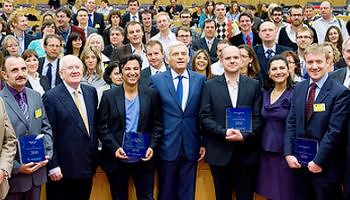 So, the EU is apparently planning to make it illegal to sell eggs by the dozen – or indeed to sell any products at all by number, instead forcing producers and retailers alike to sell only by weight.
So, the EU is apparently planning to make it illegal to sell eggs by the dozen – or indeed to sell any products at all by number, instead forcing producers and retailers alike to sell only by weight.
“Utter madness!”, you cry. “How could anyone possibly be so stupid? It’s ridiculous!”
Yes. Yes it is ridiculous.
The story started (as far as I can tell*) in the europhobic Mail (over 1000 outraged comments and counting), before spreading to the usual suspects of the anti-EU blogs and the knee-jerk eurosceptics of Tory blogland – the latter starting with the classic cliche “You really couldn’t make it up”.
By the end of Monday, 28th June, the story had even spread to the BBC where, as of 10pm, it was ranking as the second most popular story on the site.
Shamefully for the BBC – supposedly a bastion of responsible journalism – this is a story made up entirely of quotes from supposed experts who evidently don’t know what they’re talking about, with “A UK minister” and an unnamed spokesman from the UK Federation of Bakers being added to the anonymous source that started the hysteria rolling, the “FSA spokeswoman” quoted by the Mail, who says:
“This proposal would disallow selling by numbers. Retailers would not be allowed to put “Six eggs” on the front of the box. If it was a bag of rolls, it would say “500g” instead of six rolls.”
This statement is utterly false.
Indeed, all you have to do is read the proposed regulation itself (warning: PDF) – which makes precisely no mention of outlawing selling by numbers.
In fact, quite the opposite – Annex VIII makes explicit exceptions for foods “which are sold by number”. (This only slightly amended in the final version, despite the apparent claim in the BBC article that such a get-out had been rejected.)
John Band – formerly something of an expert in the food industry in the real world – has already successfully demolished all claims that selling by numbers will be outlawed. He also helpfully points out that
eggs are already graded by weight – e.g. a ‘large’ egg weighs 63-73g – which requires them to be weighed
.
Of course, the *existing* legislation requiring eggs to be weighed is just one part of a vast array of rules and regulations that cover food packaging – none of which, it would appear, most of the supposed experts quoted in all the media coverage of this non-story know anything about.
Indeed, back in April, Compassion in World Farming was complaining about the very same proposed bit of legislation – because it threatens to *reduce* the amount of information currently required (under rules brought in a decade ago).
And please note, from that September 2000 article, this:
“To date, it has been mandatory to put the following indications on packs of eggs: the name of the trader, the number of the packing centre, quality and weight grading, number of eggs, date of minimum durability and appropriate storage, recommendations, particulars as to refrigeration/preservation in the case of grade B eggs (refrigerated or preserved eggs), packing date for eggs of other grades and for imported eggs”
Where this has been turned by the Mail and the rest of the anti-EU crowd into a story about Brussels bureaucrats’ mad over-regulation, the truth of the matter is *precisely* the opposite – these new rules are instead entirely and explicitly about deregulation, as anyone who read the original document would be able to see in a second.
The aim is not to force food producers to include *more* unnecessary information on their packaging, but to remove the existing requirements to include insane levels of detail about (for example) farming conditions, nutritional information, etc. etc. etc. As the proposal itself states:
“The emphasis is on simplifying the regulatory process, thus reducing the administrative burden and improving the competitiveness of the European food industry”
And this, ladies and gentlemen, is why you should never believe anything you read in the British press. All it takes is one hack staff writer on a paper with a political agenda to get something wrong, and soon everyone else is following the story up – not by going back to the supposed source of the outcry, but by phoning various rent-a-quotes and asking them their opinion on something they almost certainly know even less about than the journalist who started the whole thing rolling:
Hack journalist: “Hi, it’s Christopher Leake from the Mail on Sunday. What do you think about the EU’s proposals to ban selling eggs by the dozen?”
Anonymous spokesperson: “Eh? They’re proposing what? That’s ridiculous! [Insert ill-informed rant]”
Hack journalist following up initial bullshit story: “Hi, it’s Laurence Peter from the BBC. I just wanted to get your opinion on this story about the EU banning the selling of eggs by the dozen.”
First MEP to pick up the phone (in this case Glenis Willmott): “Oh, the BBC? Right… Erm… (Shit! I can’t let on that I don’t know what I’m talking about… Erm…) Well… [Insert off-the-cuff vaguely plausible explanation of why legislation that doesn’t actually exist might possibly be considered sensible, plus vague assurances that there are normally get-outs for this sort of thing, thus lending even more credence to the story even though there’s nothing actually going on.]“
And thus another Euromyth is born. It’s all strangely familiar – once again, EU deregulation is presented as over-regulation thanks to the seemingly wilful ignorance of the anti-EU press, and the poor journalistic standards of the rest of the media. Even though this story is utter bollocks, expect it to be trotted out for years to come. Just like with those straight bananas…
UPDATE: A categorical rejection of this story from the European Parliament itself:
The European Parliament’s rapporteur on the food labelling regulation, Renate Sommer (Germany, EPP group) responded today: “In principle, there will be no changes to selling foods by quantity. Selling eggs by the dozen, for example, will not be banned”.
UPDATE – 1st July: The Food Standards Agency has responded to my request for a clarification of their position, following their anonymous spokesperson’s misleading quote in the Mail.
UPDATE 2: Just came across this, via the Scottish Executive. A handy summary of existing EU egg labelling regulations. Please note:
“Minimum standards of quality and weight grading…
“The regulations apply to hen eggs marketed within the Community. They do not apply to eggs sold direct by producers to the final consumer at the farm gate, in local public markets (with the exception of auction markets), or by door-to-door selling. “
Please note also that there is already a requirement to own “a machine for grading the eggs by weight”.
There. Is that categorical enough for you?
* I very much doubt the story actually originated at the Mail – they don’t have the resources to trawl through reams of EU legislation looking for things that they can turn into stories, because the vast majority of EU legislation is deeply boring and innocuous. I’d imagine that they got the tip-off from some anti-EU campaign group, think tank or party, probably in the form of a press release, and that the Mail also didn’t bother to look at the original text but just leapt straight onto the phones looking for quotes to pad the story out a bit. But I don’t know this for certain and so – unlike the Mail – I’m not going to state it as fact.
 The European Union Bill is one of those strange populist beasts announced by the Conservative Party in the run-up to last year’s general election, aimed squarely at keeping Britain’s eurosceptic right from abandoning them for the UK Independence Party (following David Cameron’s admission that he was not planning to hold a referendum on the Lisbon Treaty after it had already entered into force, despite what many eurosceptics had hoped/expected).
The European Union Bill is one of those strange populist beasts announced by the Conservative Party in the run-up to last year’s general election, aimed squarely at keeping Britain’s eurosceptic right from abandoning them for the UK Independence Party (following David Cameron’s admission that he was not planning to hold a referendum on the Lisbon Treaty after it had already entered into force, despite what many eurosceptics had hoped/expected).


 I may well be posting some more detailed thoughts here at some point soon – no doubt musing on the concept of a political institution
I may well be posting some more detailed thoughts here at some point soon – no doubt musing on the concept of a political institution  So, the EU is apparently planning to make it illegal to sell eggs by the dozen – or indeed to sell any products at all by number, instead forcing producers and retailers alike to sell only by weight.
So, the EU is apparently planning to make it illegal to sell eggs by the dozen – or indeed to sell any products at all by number, instead forcing producers and retailers alike to sell only by weight.